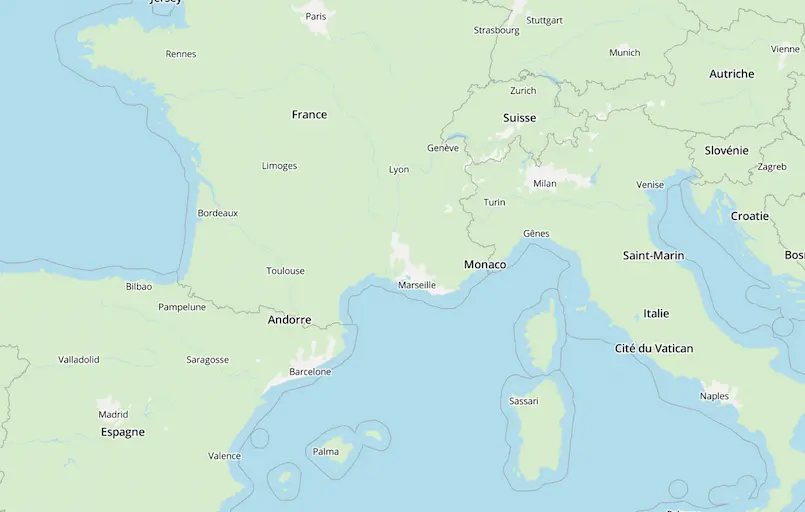Animals - yes or no?
Each campsite page shows details of whether or not pets are allowed in your holiday accommodation. You will see all information in the Special Remarks section just after the campsite description. In the search and found engine on the website, you can add a pet to your travel party. With this funtion you will be offered only the campsites where pets are allowed. On the campsite information page, you can find at the tab "accommodation". This will include costs, exceptions and if campsites ask money for final cleaning. A number of campsites only allow pets in low season. In some mobile homes pets are not allowed. In a Vacansoleil tent pets are absolutely prohibited.If you book a pitch for your own tent or caravan you are usually allowed to bring your pet. You see the prices in the price schedule. When going abroad a valid identity for a dog is compulsory. Do you want to take more than one pet? Please contact one of our employees by phone.
Please note:
Leaving pets unattended in campsite accommodation is forbidden, as it can pose several risks including but not limited to, the safety and well-being of the animal, damage to the accommodation or noise disturbances.
Campsites that allow petsAnimals - yes or no?
Each campsite page shows details of whether or not pets are allowed in your holiday accommodation. You will see all information in the Special Remarks section just after the campsite description. In the search and found engine on the website, you can add a pet to your travel party. With this funtion you will be offered only the campsites where pets are allowed. On the campsite information page, you can find at the tab "accommodation". This will include costs, exceptions and if campsites ask money for final cleaning. A number of campsites only allow pets in low season. In some mobile homes pets are not allowed. In a Vacansoleil tent pets are absolutely prohibited.If you book a pitch for your own tent or caravan you are usually allowed to bring your pet. You see the prices in the price schedule. When going abroad a valid identity for a dog is compulsory. Do you want to take more than one pet? Please contact one of our employees by phone.
Please note:
Leaving pets unattended in campsite accommodation is forbidden, as it can pose several risks including but not limited to, the safety and well-being of the animal, damage to the accommodation or noise disturbances.
Campsites that allow petsTaking pets on holiday
General rules for the transport of animals within the EU: Dogs, cats and ferrets need an EU passport to travel abroad. This passport contains a description of the animal, the name and address of the owner and proof of rabies vaccination. This new document replaces all previous passports used in Europe. In Great Britain, a pet passport is issued by an Official Veterinarian. If your veterinary practice does not have a resident OV, your vet will advise the nearest location. Your local Animal Health and Veterinary Laboratories Agency Office - AHVLA also provide these details.
If your pet belongs to a protected species, you need not only an EU passport but also a CITES document. Make sure to obtain information from the embassy of the country of destination or the CITES office in your country. Dogs, cats and ferrets must be vaccinated against rabies. This is done by the veterinarian who authorises & signs the Pet Passport.
Pets three months or younger
When taking animals three months or younger abroad with you there is no need for them to be vaccinated. However, the pet owner must provide evidence that the animal has been nurtured in the place it was born up to the start date of the journey and that it has not been in contact with animals that have possibly being infected with rabies. Animals may also be permitted to cross the border if accompanied by its mother. Each EU country makes its own decision on whether to allow animals younger than three months to enter a country. At the moment France and the UK will not permit young animals into their country. However, Holland may allow pets younger than three months if they comply to the above restrictions. Hungary only authorise the non-commercial movement of dogs/cats/ferrets under three months old, and therefore unvaccinated against rabies, if the 02/16/1/2008. numbered health cerificate is accompanied in addition. Animals younger then 3 months coming from the countries outside the EUO and not vaccinated againt rabies are not allowed to travel to Belgium, unless they come from rabie free countries, Iceland, Norway or Switserland. The owner needs to have a signed statement that confirms that the animal stayed in the place of birth since the birth and not have been in contant with animals that might have been infected with rabies. In Italiy it is not allowed to transport pets younger then 3 months by plane. And in Spain pets younger then 3 months are not permitted.
When the documents of the pet is not ok, the custums officer may hold the animal. The consequences may include:
The animal is quarantined until it meets the health requirements.The animal is returned to the country of origin.More detailed information is available from: your veterinarian or the embassy of the country concerned.
France
Dogs from the following two categories are classed as dangerous and as such are regulated by rules related to importing or passing through France. The first and second categories have to be abided by as follows: This category relates to attack dogs or/and guard dogs that are not registered as a recognised pedigree or look like any of the following breeds: Staffordshire terrier, American Staffordshire Terrier (“pit-bulls”), Mastiff and Tosa. It is prohibited to take these dogs for a stay in France or pass through France. This category of guard dogs that are pure dog breeds and registered as a recognised pedigree, such as Staffordshire terrier, American Staffordshire Terrier, Rotweiler, Tosa, and dogs that look like the breed Rotweiler. It is permitted to bring these dogs for a stay in France or pass through France. However this is on the condition the dog is muzzled and kept on a leash in places that are accessible to public and that the owner has insurance for the animal. Places that are accessible to the public are defined as places where a dog could encounter people. Campsite rules in regards to dogs may differ. If you have a dog registered in the second category please contact our sales team who will be happy advise you. We will contact your preferred campsite in relation to their rules and procedures about your dog(s).
Holland
The general rules for the transportation of animals within the EU apply and are valid for the Netherlands.
Spain
Certain breeds covered by the scheme for 'dangerous dogs'. This includes for Pit bull and Dogo Argentino, but also for the Rottweiler and the American Staffordshire Terrier. Strict rules for these races: there is a leash and muzzled obligation and a permit must be requested.
by car: it is not allowed to transport the pet loose in the car. There are different ways to transport the pet safely. There are benches to transport your pet in several kinds and measures. You can by a safety belt system for your pet to fix at the back seat in the car. Or install a safety net or a fence between the car and the trunk.
Portugal
There is a muzzle obligation n crowded, public places for the Bull Terrier breeds and between these breeds, and crossings. When asked, you need to muzzle your dog, regardless of breed. Your dog must also be registered with the competent authorities and the owner needs to have a cover insurance.
Italy
There is a muzzle obligation in crowded, public places for the Bull Terrier breeds and between these breeds and crossings. When asked, you need to muzzle your dog, regardless of breed. In public pages you need to leash and muzzle your dog.
Switzerland
Switzerland has adopted the EU regulations. All breeds are welcome but pitbulls, American Staffordshire Terriers, Staffordshire bulterriërs, bulterriërs, Dobermans, Argentine dogs, fila Brasileiro's, rottweilers, mastiffs, mastin Espagnol, mastino Napoletano and tosa should always be kept on a leash and wear a muzzle.
Moreover, imports of dogs allowed with cropped ears or tail is not allowed, but the local governments will take less rigorous actions, if it is concerning a short stay. Locally, there are special rules regarding leash and muzzle.
Germany
According to legal provisions, dogs of the following breeds or crossbreeds can not be transported or imported in Germany along with other dogs: Pit Bull Terrier, American Staffordshire Terriers, Staffordshire Bull Terriers, Bull Terriers. The same applies to other varieties of races that are considered dangerous. Crossbreeds In Germany usually dogs must wear a muzzle in public transport.
Belgium
The Rottweiler is usually not permitted in the region of Quaregnon. It is vital they are muzzled out in public and they are not permitted at public functions such as markets, festivals and sports events
Austria
On public transport your pet must be on a leash and muzzled. In some areas there are precautions taken in respect of rabies. There are red warning signs and you will be advised to keep your pet in the car where possible. General countrywide regulations about dog-handling do not exist, but local regulations may lead to restrictions.
Hungary
From January 2013 the classification of dogs are based on their rate of dangerous behaviour, not based on their species. Accordingly, some dogs that has been rated dangerous earlier e.g. Straffordshire Bull Terrier, can be brought into the country without a permission. When a dog is rated as dangerous by the Hungarian government, special conditions have to be taken into consideration (e.g. a little child cannot walk the dog alone). According to the European Union laws the EU pet passport, microchip and vaccination against rabies is obligatory. It is compulsory to have your pet on a leash. When asked you have to muzzle your pet so please make sure you have this with you. Officially, dogs are not allowed to swimm in the Balaton lake and not in the Velence lake. Dogs on free beaches are allowed.
Czech Republic
You must report your arrival for air transport 24 hours in advance. More information at Czech Embassy. You should also have a muzzle with you. The dog does not have to wear it, but you must be able to show it. You need muzzle your dog in public transport. The Czech Republic is perceived as a country for very dog friendly holidays.
Denmark
Following dograces are forbidden in Denmark: Pittbull Terrier, Tosa Inu, Amerikansk Staffordshire Terrier (Amstaff), Fila Brasiliero, Dogo Argentino, Amerikansk Bulldog, Boerboel, Kangal, Central Asian Ovtcharka, Kaukasian Ovtcharka, South Russian Ovtcharka, Tornjak, Sarplaninac. Dogs must be leashed in public places. It is forbidden to let dogs swim by the public beaches carrying the blue flag. Dogs four months or older must wear a collar with dog tag, where the owner's full name, address and telephone number appears.
Croatia
The use of the leash is compulsory in public places. The following breeds must wear a muzzle: Doberman, American Staffordshire Terrier, Bull Terrier, Rottweiler, Germand and Belgian shepherd, Japanese warrior dogs, Japanese Spit, Mastiff, Sarlaninac shepherd. Pitbull and their cross breeds of this family are not permitted. For Bordeaux Dogs and Napel Mastiff dogs is the use of the leash required, but the use of the muzzle is not mandatory everywhere.
Slovenia
The use of the leash is mandatory in cities and also in nature. For dogs that comes from a country where the number of rabies infected animals is high, it is equired to perform a blood test, one month after the rabies vaccination and three months before departure.





